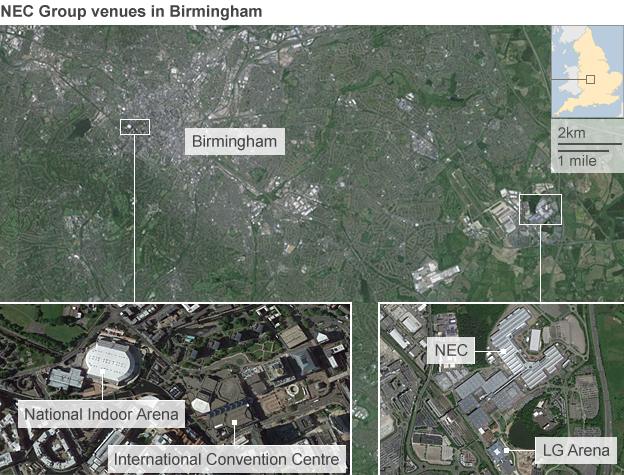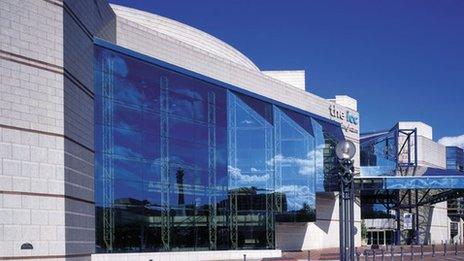Birmingham's NEC Group put up for sale
- Published
The group supports the equivalent of 29,000 jobs, the city council says
Birmingham's NEC Group has been put up for sale by the city council.
The council, facing a £1.1bn bill for equal pay settlements, says it wants to ensure the existing uses are preserved.
The group is "vitally important" to the West Midlands economy, bringing in £2bn a year and supporting the equivalent of 29,000 jobs, the council said.
As well as the National Exhibition Centre, the group incorporates the International Convention Centre, the LG Arena and the National Indoor Arena.
The pay settlements have been agreed with thousands of women who, over many years, were paid less by the city council than workers - mainly men - who did equivalent jobs.
One law firm is dealing with about 5,000 cases.

A spokesman for law firm Leigh Day said it welcomed the news the council was seeking ways to raise funds to pay its clients.
The council said it would be inviting potential buyers to participate in a pre-qualification process for the NEC Group, which also includes national ticketing agency the Ticket Factory, hospitality company Amplify and its catering arm, Amadeus.
Sir Albert Bore, leader of the Labour-run council, said the key purpose of establishing the NEC Group had been to drive economic development and regeneration.
He said: "This has been achieved, but now the NEC Group has reached a point in its evolution where it needs to be able to adopt the financial disciplines of a private, rather than a council-owned, company to enable the next stage of strategic development."
The sale would have gone ahead regardless of the council's financial issues, he claimed.
The council said it intended to retain "claw-back rights" over potentially valuable land at the NEC site, next to where the HS2 Birmingham interchange could be built.
BBC correspondent Phil Mackie says the council has assets worth up to £6bn, which includes things it cannot sell because of the potential outcry, like the Town Hall, the council house and parks. Assets including housing stock, commercial land and shopping centres might also be offered for sale.
NEC Group chief operating officer John Hornby said the announcement was "good news".
"A move into private sector ownership will allow the management team to take the risks associated with developing a dynamic, privately-owned business, and supports our vision and ambition for future growth," he said.
The National Exhibition Centre was opened by the Queen in 1976
Tony Rabaiotti, regional head of local government at UNISON, said he does not think there will be job losses, but the union is keeping "a close eye on the situation".
"The NEC has been run at arm's length for many years now and, at the moment, we are not anticipating job losses," he added.
"This is just a symptom of the dire financial straits Birmingham and other councils are in - the so-called austerity measures of central government are behind these cuts."
Mr Rabaiotti said people are paying council tax and are "not getting the services they are paying for".
However, Richard Taffler, professor of finance at Warwick Business School, said jobs could be put at risk.
"One can't trust private sector businesses to see the West Midlands economy as an important goal," he said.
"The problem with selling such a major driver of economic activity is that a private sector business would not be running the NEC group for the benefit of the broader community but for its own shareholders and to maximise profits. The private sector has very different goals to the city council."
In terms of who might be interested in buying the group, Professor Taffler said it was "wide open".
"It could be a conference centre management business or a private equity house," he said.
"It could be a property investment company or even the property arm of an investment bank. One would expect overseas companies to be interested, as well as local firms."
The National Exhibition Centre, which opened in 1976, is situated outside the city, close to Birmingham Airport, alongside the LG Arena. The ICC and NIA are in the city centre.

The International Convention Centre opened in 1991
- Published5 March 2014
- Published5 March 2014
- Published15 January 2014
- Published24 October 2012
- Published24 October 2012
- Published24 October 2012
- Published29 November 2011
- Published21 September 2010